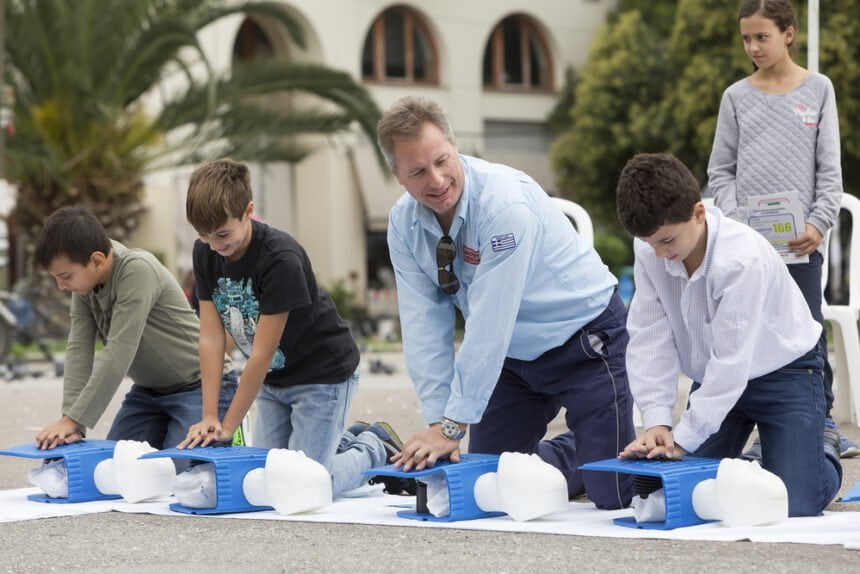Most of us are familiar with the steps of performing CPR. But if you found yourself in the middle of a medical emergency, would you have the skills and confidence to successfully perform this life-saving procedure? This is why CPR certification exists. Sure, anyone in this day and age can hop online and read about performing CPR or watch a quick instructional video. But when someone’s life is on the line, these resources simply won’t cut it.
By enrolling in a CPR training class and earning your official CPR certification, you’ll feel secure knowing that you received the latest information from professional instructors. Like all medical knowledge, the process of CPR is continually being improved and adapted to meet the needs of a changing environment. CPR certification keeps you at the cutting edge of CPR training and provides you with the knowledge and skills to potentially save a life.
Here, we’re taking a closer look at why you need CPR certification and the benefits you’ll receive from this type of specialized medical training. We also look at one of the latest advancements in CPR training, 100 percent online CPR classes, and why so many students are turning to this new digital model of learning.
WHAT IS CPR CERTIFICATION?
CPR, or cardiopulmonary resuscitation, is a life-saving medical procedure that practically anyone can learn. Through a combination of chest compressions and rescue breaths, you can stabilize the victim of a cardiac arrest episode until medical personnel arrive on the scene.
When someone undergoes cardiac arrest, the heart is unable to pump blood and oxygen throughout the body. When the brain goes even just a few minutes without oxygen, permanent brain damage or even death can occur. This is why it’s so critical for bystanders to act swiftly in the event of an emergency. When it comes to a cardiac arrest episode, every second truly counts. It should also be noted that CPR is intended as a temporary measure—not a final treatment method. CPR can stabilize the victim for a matter of time, but paramedics will be required to assist at some point. This is why it’s critical to first call 911 before performing CPR.
To ensure you receive the best training available, we have CPR certification courses. These specialized medical training programs tap into the experience of OSHA-trained instructors to provide you with important medical knowledge and information. They also incorporate hands-on learning so that you can practice the chest compressions and rescue breaths that form the foundation of this procedure. Experienced instructors will guide you every step of the way and answer your questions. They can also observe your CPR technique and offer adjustments and improvements when needed. Practice makes perfect, right? With CPR training and certification, you’ll have the confidence to jump into the midst of a medical emergency so that you could potentially help to save a life.
HOW LONG DOES CPR CERTIFICATION LAST?
Upon earning your CPR certification, this designation will last for two years. After two years, you’ll need to take a CPR recertification course. While this may seem unnecessary, CPR recertification classes are actually very important.
CPR may seem straightforward, but this process has actually changed quite a bit over the years. Methods of resuscitation have been practiced for hundreds of years. Earlier versions included using fireplace bellows, horses, or hanging the victim upside down to restore breathing and circulation. Luckily for our time, medical experts have made major improvements to CPR and have given us our modern form of chest compressions and rescue breaths.
To keep your skills fresh and your knowledge current, CPR recertification is a necessary step for anyone practicing CPR. A recent example of the need for recertification comes from just last year. In response to the COVID-19 pandemic, the American Heart Association (AHA) updated their CPR guidelines to include methods and techniques for keeping bystanders safer when performing CPR. These guidelines include the proper use of personal protective equipment (PPE) and highlighting the use of hands-only CPR, which, by cutting out rescue breaths, can cut down on the potential for spreading disease.
DO I REALLY NEED CPR CERTIFICATION?
As you can now see, there are several reasons why you will certainly benefit from receiving your CPR certification. Whenever someone’s health is on the line, you should never be forced to rely on your best guess or potentially incomplete online resources. Simply reading about CPR may provide a solid foundation, but it can’t match the personalized approach and level of detail and attention received from a CPR training course.
So, to answer the question: yes, you really do need CPR certification. With hundreds of thousands of lives lost to cardiac arrest every year in the United States, having more bystanders trained and certified in CPR is the most effective way to reduce this number, make our communities safer, and ultimately save lives.
BENEFITS OF ONLINE CPR CERTIFICATION
Nowadays, you can do almost anything online. From ordering dinner, learning about world history, or even finding a date—digital tools have completely changed the world we live in. With the rise in e-learning and online classes, it only makes sense that you can now learn CPR online. Just think: gaining a valuable medical skill without ever having to leave home—how does it get any better?
More and more students are shifting to online CPR certification courses. Why? Some of the top reasons include:
· Convenience: learn any time, anywhere.
· Timing: most students can earn their CPR certification within days.
· Cost-effective: in many cases, online CPR certification is cheaper than the traditional in-person models.
CONCLUSION – WHY IS A CPR CERTIFICATION SO VALUABLE?
If you ever find yourself in the middle of a medical emergency, you won’t have much time to think. Cardiac arrest victims require immediate attention. For every second spent deliberating whether or not to act or how to safely provide assistance, their survival rate continues to drop. This is why CPR certification is so valuable. With thorough and comprehensive training, guided by OSHA-trained professionals, CPR training will give you the skills and confidence to act (and act quickly) when you’re needed.






